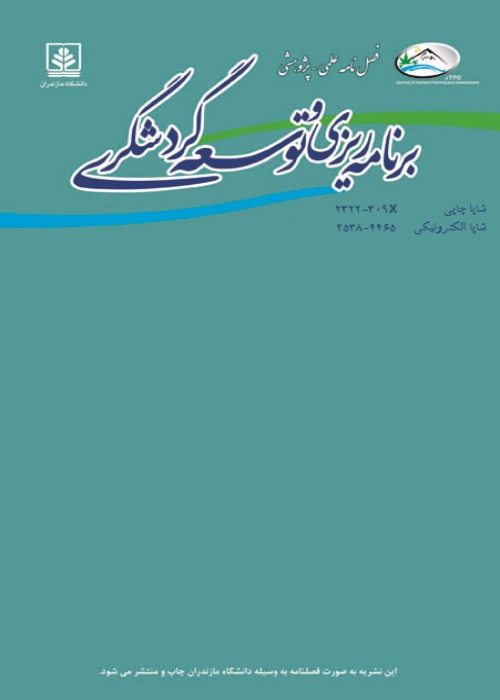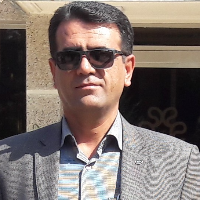An Analysis of the Attitude of Rural People toward Rural Tourism Using Planned Behavior Theory Case Study: Doroodzan District, Marvdasht County
Author(s):
Abstract:
Introduction
Tourism is a new approach in rural development which can be useful in empowering local people, human resources development, diversifying rural economy, crating job opportunities, increasing living standards, decreasing rural- urban divide and reducing migration from rural to urban areas. Rural tourism focuses on actively participating in a rural lifestyle. It can be a variant of ecotourism. Many rural villages can facilitate tourism because many villagers are hospitable and eager to welcome (and sometime even host) visitors. Rural tourism allows the creation of a replacement source of income in the non-agricultural sector for rural dwellers. The added income from rural tourism can contribute to the revival of lost folk art and handicrafts. Of course, it should be noted that tourism have some advantages and disadvantages like other development activities. For example, despite some advantages that mentioned above, some other consequences such as environmental degradation, falsely increasing prices of goods and services, damage to agricultural activities and so on, can be considered as disadvantages of rural tourism development. Therefore, the host community even may have negative attitude towards rural tourism. However governments assign a lot of budgets on rural tourism development, but less attention is paid to the attitude of the host community towards it. Thus, the aim of this study was to investigate rural people's attitudes towards rural tourism in the Doroodzan District of Marvdasht County, Southern of Iran.Research
Method
Survey research method was used to study factors affecting rural people's attitudes based on the Theory of Planned Behavior. Data were collected using a predesigned questionnaire with a sample of 250 respondents that were selected based on Kerjcie and Morgan Sampling Table and stratified random sampling technique. Face validity of the questionnaire was verified by faculty staff of Rural Development Department of Yasouj University and its reliability was also verified using Cronbach's Alpha reliability coefficient (from 0.610 to 0.868). The questionnaire consisted of different statements about research variables including tourism, observation, attitude, subjective norm (Normative beliefs and motivation to comply), perceived behavioral control (control beliefs and control beliefs power), awareness, experience, and perceived usefulness which were measured using Likert Scale responses. Findings: The results showed that investment in tourism in the region is very poor. Either villager's knowledge about rural tourism, or tourism advertising have an unfavorable situation in the study area. Rural people have a fairly favorable attitude toward tourism, and tourism caused improving marketing of agricultural products and commodities. Moreover, there were statistically significant relationships between attitude as dependent variable in one hand and independent variables such as income, awareness about rural tourism, perceived usefulness of rural tourism, observation, values, subjective norms, perceived behavioral control and prior experience about rural tourism
Conclusion and recommendations: Due to different problems in rural areas of Iran such as unemployment, low productivity and so on, attention to the other development approaches such as tourism can be considered as a guarantee for improving the quality of life in these regions. Nowadays, Agriculture requires less manual labor. The agricultural lands have been scattered to different and small parts. This trend is causing economic pressure on different villages, which in turn causes young people to move to urban areas. There is however, a segment of the urban population that is interested in visiting the rural areas and understanding the lifestyle. But, as mentioned above, the development of rural tourism may have different positive and negative consequences. Thus, the study of host people's attitude toward rural tourism I really necessary. The results of this study showed that rural people have a fairly positive attitude towards the development of rural tourism in their living location. Therefore, to avoid a negative attitude towards the tourism development and also to encourage people to invest and work in this field, some policies should be considered and executed in such regions such as:- advertisement about tourism development functions, benefits and strategies in mass media for host communities
- holding extension-education classes for villagers in the field of tourism especially rural tourism
- Providing banking loans and facilities for development of infrastructures and other tourist services in the region
- Introducing tourism attractions of the region to the other parts of the country or even world.
Keywords:
Language:
Persian
Published:
Journal of Tourism Planning and Development, Volume:5 Issue: 19, 2017
Pages:
153 to 174
magiran.com/p1669110
دانلود و مطالعه متن این مقاله با یکی از روشهای زیر امکان پذیر است:
اشتراک شخصی
با عضویت و پرداخت آنلاین حق اشتراک یکساله به مبلغ 1,390,000ريال میتوانید 70 عنوان مطلب دانلود کنید!
اشتراک سازمانی
به کتابخانه دانشگاه یا محل کار خود پیشنهاد کنید تا اشتراک سازمانی این پایگاه را برای دسترسی نامحدود همه کاربران به متن مطالب تهیه نمایند!
توجه!
- حق عضویت دریافتی صرف حمایت از نشریات عضو و نگهداری، تکمیل و توسعه مگیران میشود.
- پرداخت حق اشتراک و دانلود مقالات اجازه بازنشر آن در سایر رسانههای چاپی و دیجیتال را به کاربر نمیدهد.
In order to view content subscription is required
Personal subscription
Subscribe magiran.com for 70 € euros via PayPal and download 70 articles during a year.
Organization subscription
Please contact us to subscribe your university or library for unlimited access!



